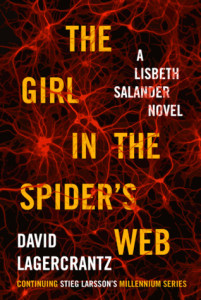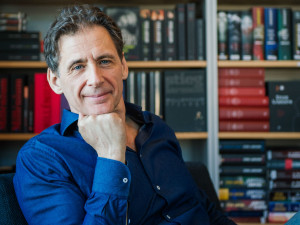 I read the Lisbeth Salander trilogy by Stieg Larsson in 2011. By that time the books had reached best-seller status around the world and it seemed as if everyone had read them except me. I found all three of the books to be captivating page-turners that I couldn’t put down. The anti-hero, Lisbeth Salander, was a new kind of hero: an extraordinary hacker who followed her own rules to right injustices. Mikael Blomkvist is the journalist who works with her and gets the glory. When I spotted the book, “The Girl in the Spider’s Web” in Barnes and Noble I was hesitant to buy it. Larsson died of a heart attack before any of his trilogy was published. Could Lagercrantz continue the best-selling story-telling with which Larsson had introduced these characters?
I read the Lisbeth Salander trilogy by Stieg Larsson in 2011. By that time the books had reached best-seller status around the world and it seemed as if everyone had read them except me. I found all three of the books to be captivating page-turners that I couldn’t put down. The anti-hero, Lisbeth Salander, was a new kind of hero: an extraordinary hacker who followed her own rules to right injustices. Mikael Blomkvist is the journalist who works with her and gets the glory. When I spotted the book, “The Girl in the Spider’s Web” in Barnes and Noble I was hesitant to buy it. Larsson died of a heart attack before any of his trilogy was published. Could Lagercrantz continue the best-selling story-telling with which Larsson had introduced these characters?
The answer is yes – and no. In many ways I liked “The Girl in the Spider’s Web” better than the previous books. Lisbeth Salander is a more of a conventional hero in this novel. She is still looking for those people that destroyed her life, including her twin sister. She shares what she knows with Mikael who digs at the story to tie it together and tell it to the world.

In “The Girl in the Spider’s Web” Lisbeth is at her hacker’s best. She burrows her way into the NSA and SAPO, uncovering an unholy alliance. Frans Balder has decided to leave behind his increasingly dangerous research on artificial intelligence to devote himself to being a father for his autistic son. He takes custody of his son, August, and begins to unlock his child’s artistic and mathematical genius. Then he is killed and his son is the only witness.
Lisbeth is on the trail of the killers, always one step ahead of the police. Mikael Blomkvist is conveniently inserted into the story when Balder decides to come clean about his research and dangers involved in making it public. Lisbeth gives Blomkvist just enough information that he becomes a suspicious character for the police. How everything is connected and how the story plays out makes the book a page-turner. In all of this, Lagercrantz did an excellent job continuing the characters in the new book.
I found the underlying theme of the book fascinating. Lagercrantz made me think about loyalty. To whom am I loyal and to what do I give my loyalty? Are we loyal to our country, our family, our company, our boss, our friends? And when loyalties conflict, which loyalty will win out? Different characters in the book answer this question in different ways.
Unfortunately, Lagercrantz had a stable full of characters to deal with from the previous books and the story sometimes seems contrived. Some of the characters are thrown in for no particular reason and I think it might have been a stronger plot without them. The inserted plotline about the Millenium being in financial trouble felt unnecessary.
Lisbeth herself is not as strong in this story. In finding her niche, she has also lost some of her darkness. I think Lagercrantz expects Lisbeth’s twin sister to fill the void in terms of being a sociopath, but Lisbeth is not the same anti-hero. I like her better – but is this the way she is supposed to be? I would argue Lisbeth’s character is developing over the course of time. Our purpose changes through our lives and often our personality mellows out a bit. Maybe this is what is happening to Lisbeth.
If you liked the first three books in the Millenium series, then give this one a shot. If you like dark and violent anti-heroes, then you may not like this book as much as the first three. If you prefer your heroes a little more on the “right” side of justice, you might like this one better.
